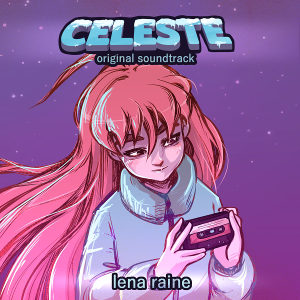Celeste Original Soundtrack
 |
Album Title: Celeste Original Soundtrack |
| Record Label: Radical Dreamland |
|
| Catalog No.: N/A |
|
| Release Date: January 25, 2018 |
|
| Purchase: Buy at Bandcamp |
Overview
How often is a soundtrack greater than the sum of its parts? Music composed for any medium must reinforce the mood of whatever medium it compliments. Strip away the medium, however, and what remains? In the case of a video game soundtrack, listeners can expect to be left with a memorable collection of tunes and ambiences. Yet some soundtracks are so cohesive and thoroughly thought out that they accomplish something greater.
Take the original soundtrack to an indie breakout hit called Celeste, composed by Lena Raine. Celeste has already received critical acclaim for the grace with which its soundtrack compliments its grueling platforming gameplay. Taken out of the context of the game, however, Celeste’s soundtrack reveals its true brilliance, telling a story as captivating as the game that inspired it without leaning on its source as a crutch.
Body
“Prologue” ushers listeners into the icy world of Celeste as sweetly as it can before hurling them straight into a snowstorm. Deceptively precious piano tones backed by synth bells lull the listener into a sense of calm. Then the calm breaks. A sweep of white noise cracks the quietude like an avalanche, giving way to a flurry of frenzied synth arpeggios that intensifies until all sounds come to a sudden halt, and their reverb tails echo off the face of a cliff. Track two, “First Steps,” is where Celeste kicks off in earnest. Descending piano arpeggios and puffy hi-hats give the impression of ice crunching beneath boots in snowfall, while pulsating synth chords fill the atmosphere with a sense of electricity and excitement. Here the main melodic motif makes its debut, diving and ascending as though tracing the outline of a mountain range. “First Steps” succeeds at establishing Celeste’s impressionistic and chipper tone while laying out the welcome mat.
“Resurrections,” in contrast, yanks the mat away with its haunting and foreboding aura. An arpeggiator dark enough to resemble a muted pipe organ launches its ascending lines skyward, and the reverb is so vast and murky that it seems to swallow the arpeggios whole. Then the reverb cuts away and a shuffling drum kit steps up to brighten the atmosphere, though the tone remains spooky even with the lights on. That sense of discomfort is validated at the midway point of the track. The drums disappear, a gurgling pad hums subtle disturbances, and a wormy lead transforms the upbeat melodic motif from “First Steps” into something creepy and threatening. All hell breaks loose as the beat returns alongside a panicked piano and distorted vocals. The panic subsides, but a deep and jagged bass and a thud at the piano’s lowest register conclude the track on an apprehensive note – leaving the meditative solo piano track “Awake” to sort through the emotional fallout.
Tensions run wild in Celeste, and the album does a remarkable job of mapping them out across the narrative. By the time “Checking In” arrives with its chilled groove and slow, pearly melody, the disparate piano and pads of “Postcard from Celeste Mountain” have already soothed away the drama of “Resurrections.” Yet once the goofy-yet-ghostly vibes of “Spirit of Hospitality” wear off, “Scattered and Lost” calls on listeners to keep their guard up, beginning with playful piano and shakers but switching gears with the inclusion of a pumping bass and an intricate drumbeat. In “Anxiety,” the piano steadily parses out fragments of the main theme, but finds itself struggling to suppress grating pads that come to dominate the track before they recede. Later in the album comes “In the Mirror,” which assails reversed audio clips taken from its preceding track with decrepit synths. Yet the follow-up track, “Madeline and Theo,” relieves the tension once again, lending the main melody to an intimate guitar and piano coupling under a starry sky of panned chip-tune blips. Comfort and anxiety are constantly embattled in Celeste, and some transitions between tracks are so smooth that the album seems intent on betraying the listener’s trust. Case in point: when the harmonious acoustic voices of “Madeline and Theo” have faded, “Starjump” sees the starry chip-tune layer decay into shrill abrasion over bit-crushed drumming.
The one sensation that applies broadly to the soundtrack is that its music evolves slowly. Since Celeste’s music was designed for dynamic implementation, a number of tracks on the album go through a lengthy process of permutation. The effect this has on the listening experience varies from track to track. Some tracks rely on their intricacy to keep the listener engaged: “Golden,” for example, begins with piano ostinatos so confident in their triplet metric identity that the listener would have a hard time predicting the 4/4 beat at the three minute mark. Other tracks forego engagement as a primary goal and revel in their plain sweetness, like the depressive and rubato-infused “Quiet and Falling.” In either case, Celeste’s tracks take their time cycling through their material, and the soundtrack as a whole demands patience from its listeners.
The payoff makes patience worth the while. “Reflection” takes time to wade its way out of melancholy, but serves as a suitable setup to “Confronting Myself” – the emotional pinnacle of the album. With its leaping bass, ecstatic synth arpeggiation and choral chants, “Confronting Myself” raises Celeste’s energy level to new heights. That energy reaches its zenith when the vocals begin to glitch out and fragment, and the track’s abrupt TV-static white noise conclusion seals the excitement. “Little Goth” revisits the nervous piano-centric sentiments of “Awake,” and from there the album leaps into its grand finale, “Reach for the Summit.” Musical elements from the album’s most memorable moments, including the frenzied synth arpeggios alluded to in the prologue track, make their return in a medley that is both well-organized and beautifully executed. For the album’s denouement, “Exhale” employs a pattering piano and an aurora-like pad to soften the mood. Light piano clusters and synth-work take their final bow in “My Dearest Friends,” wrapping up the album with nods to the game’s main melody and “Chapter Complete” theme – but not before “Heart of the Mountain” invites listeners on one last curious odyssey.
Summary
That each of Celeste’s twenty-one tracks merits attention is an achievement in its own right. This is no accident, either: each track serves to keep Celeste’s story moving in a fresh new direction. Taken together, they make it clear that Lena Raine has paid painstaking attention to the overarching musical narrative of Celeste. The result is a complete musical story that any listener can appreciate – even without the context of the medium it compliments.
Do you agree with the review and score? Let us know in the comments below!
5
Posted on March 16, 2018 by Reilly Farrell. Last modified on March 16, 2018.














